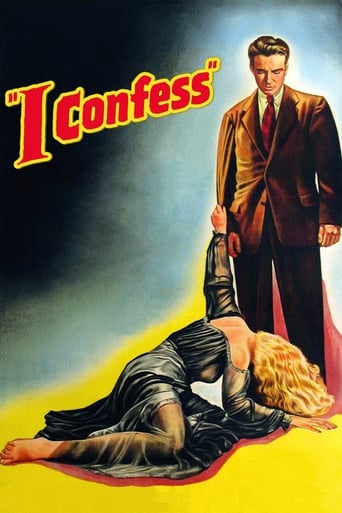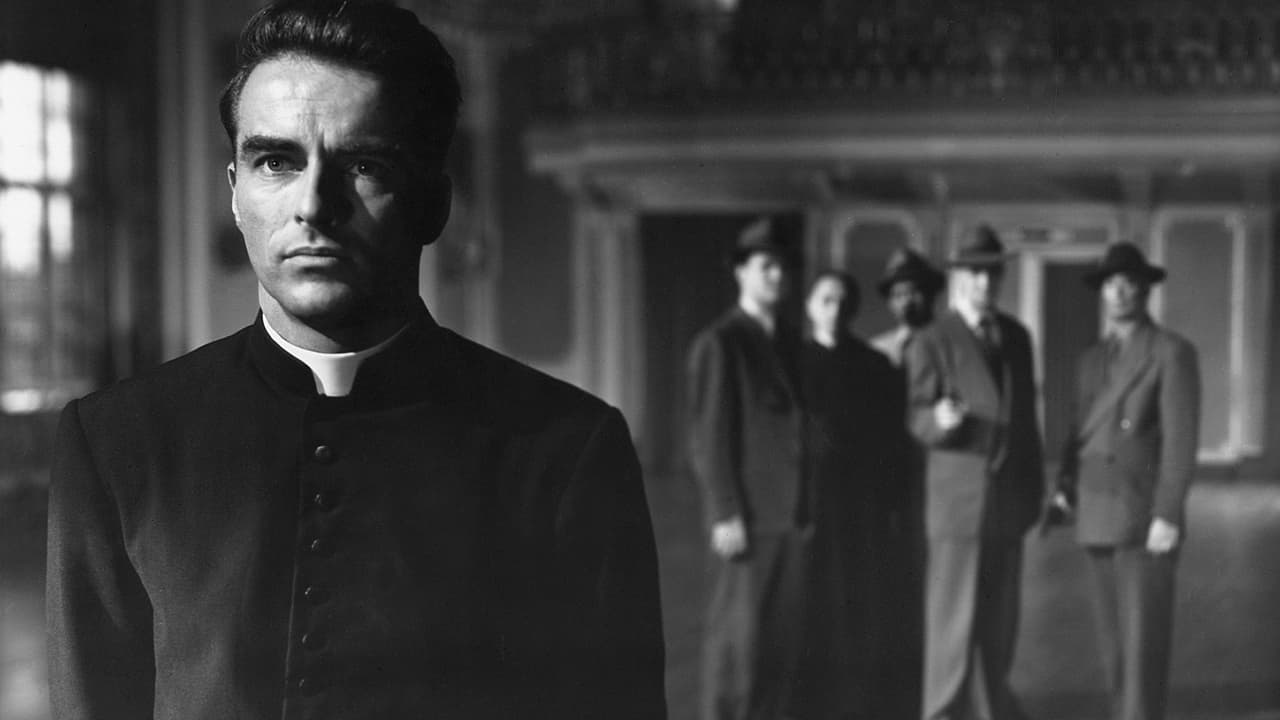CinePete
Montgomery Clift plays Father Logan, a priest in Quebec City who receives a murderer's confession and must respect his vow of secrecy, even when circumstantial evidence incriminates him in the murder itself. He also has obligations to a politician's wife (Anne Baxter), herself involved in the case through a previous love affair with Father Logan.We expect Hitch to do something quite startling with the material, but I Confess turns out comparatively flat and somber, without the trademark Hitchcock humour. There are some compelling stylistic flourishes and considerable tension, particularly in the opening and closing scenes, but generally I Confess is more of a psychological drama than a suspense thriller, and the psychology here, unlike other Hitchcock films, lacks much intensity. ,We never get inside the psyche of Father Logan. He remains closed to the spectator, guarded, seemingly impervious to human emotions. Reportedly, tensions between director and method actor Montgomery Clift prevented full treatment of the character, and he comes across as a wooden, saint-like figure who seems emotionally removed from his predicament. In addition, the Production Code would prohibit too much license outside a strict clerical portrayal of a Catholic priest. Thus, the earlier romance with the politician's wife has little depth of emotion. Anne Baxter's decorative, overly romantic "confession" seems a mere fantasy from a teen romance novel. Surprisingly, it is Alma, the murderer's wife, who slyly engages our attention. The burden of confession falls on her as well as Father Logan - they are compatriots, condemned to rigorous silence. As Alma, German actress Dolly Haas conveys deeper anguish than does Clift, and there is great satisfaction in seeing her set things right at the end, standing up against a judgmental mob and her own deadly husband.The murderer Otto Keller (O.E. Hasse) also has more dimension than the main characters - truly a treacherous figure, abusive, filmed in sinister angle throughout the film. His "confession" at the end has intensity and feeling, and when he tells the priest, "I am as alone as you are," he gives valid insight into the plight of Father Logan himself.The visual level of I Confess compels our attention. The film is well photographed: the alleyways, churches, stone walls, and Old World architecture, along with the landmark Chateau Frontenac, give Quebec City both a Gothic and a contemporary film noir quality.The occasion of filming I Confess in Quebec City was apparently an event in itself, and provides the basis for Robert Lepage's later Canadian film Le Confessional (1994).
Wizard-8
When the various films of Alfred Hitchcock's career are discussed, this particular one isn't discussed at length or even just mentioned all that often. It may be that the central plot - a priest hearing a murder confession but because of his vows is unable to tell the police - was old hat even back in 1953. It may be that the central character, played by Montgomery Clift, is kind of hard to get a handle on - I couldn't really understand what was going on in his head many times through the movie. Another possible reason for the somewhat obscurity of this movie may be because unlike a number of other Hitchcock movies, you don't really feel the screws tightening as the movie progresses - there isn't really much doubt as to whether Clift's character will be proved innocent or not. On the positive side, the movie is very well photographed on picturesque locations in Quebec. And I confess (ha!) that I wasn't bored at any time... though I usually knew what was going to happen some time before it happened. Despite a few good qualities as these, as I said in my summary line, this movie has to be considered lesser Hitchcock, and can only really be recommended for big fans of the director... and even they might have some issues with the movie.
cstotlar-1
I hadn't seen this film for some years when I caught it on TV. My opinion(s) have changed since the first viewing and since I've seen or re-seen all of Hitch's films, a certain new perspectives came into play. Guilt and oppressive authority pop up so often in the director's films, some times directly but quite often by insinuation. In this film, these two topics take a major role. It has been written that Montgomery Clift was drinking while the filming took place although I couldn't see anything in the final draft. I know also that he was "method" while Hitch was definitely not, so that might have been a source of conflict. Again, nothing was apparent on screen. Actually, the role of a priest in this work would not have been happy hunting ground for any method actor. Clift was settled on after a number of extremely good actors turned the role down. I've always enjoyed the visual aspect of Hitchcock's cinema and his daring "behind" the camera but in this film there was no room for unusual angles, editing brilliance or anything like that. It turned out to be a film of ideas and conflicts within agreements and there is nothing "cinematic" about that. I am happy to have seen this film once again as I would be with just about any film directed by Hitchcock, particularly during the fifties and sixties, but this once takes back seat to almost all of the others around it.
James Hitchcock
As others have pointed out, "I Confess" is probably one of Alfred Hitchcock's lesser-known films, certainly when compared to the likes of "Psycho", "North by North-West" or "Vertigo". And yet in terms of quality I would rank it alongside those films; it certainly does not deserve to be relegated to the ranks of "lesser Hitchcock" together with something like, say, "Stage Fright" or "Torn Curtain". Perhaps the reason is that it does not contain what have come to be thought of as typical Hitchcock touches; there is very little humour and no set-piece "suspense" sequences. There are no typical "Hitchcock stars"; I suspect that it might have become better-known had it starred, say, James Stewart and Ingrid Bergman, or Gregory Peck and Grace Kelly, rather than Montgomery Clift and Anne Baxter, neither of whom made another film with Hitch. It has a "Hitchcock blonde" in the shape of Baxter, but her character is in many ways untypical of the director's female leads. One typically Hitchcock feature is its theme, that of a man wrongly accused of a crime, but there is an unusual twist. The hero is Father Michael Logan, a Catholic priest from Quebec. (Much of the filming was done on location in the city; in keeping with Hitchcock's fondness for landmark buildings the finale takes place in the famous Château Frontenac hotel). Father Logan finds himself coming under suspicion after a corrupt lawyer named Villette is found murdered. The link between them is that Villette was blackmailing Ruth, the wife of local politician Pierre Grandfort and an old girlfriend of Father Logan before he became a priest, and the police suspect that he killed Villette to protect his former lover. The twist is that Logan actually knows the identity of the killer. It was Otto Keller, a German immigrant and the husband of Logan's housekeeper Alma. (Is it coincidence that she has the same Christian name as Hitchcock's own wife?) The motive was robbery; it had nothing to do with Villette's blackmail of Ruth. Because Keller has formally confessed his guilt to Logan, however, the priest is bound by the "seal of the confessional" and cannot implicate Keller, even when he is himself arrested and charged with the crime, at that time a capital offence in Canada. The Hitchcock film with which "I Confess" has most in common is probably "The Wrong Man", which also showed how easily an innocent man could be suspected of a crime. Like that film it contains a court scene, something Hitchcock generally preferred to avoid. (It is said that he withdrew from directing "The Wreck of the Mary Deare" because he could see no way of making it except as a courtroom drama). There are also similarities with "Marnie", another film which relies more upon psychological drama than physical suspense. It is said that Hitchcock, who disliked "method" actors, did not enjoy working with Clift, and yet it is Clift's performance which is vital to the film's success. Logan is a man prepared to die rather than betray his religious beliefs and his priestly duties, something which in many people's eyes would make him a saint, and playing a character who is virtuous to the point of saintliness can often be a thankless task. With Clift, however, we are always aware that Logan is a flesh-and-blood human being, not a mere plaster saint. He combines well with O. E. Hasse as Logan's evil angel Keller, a man tormented by the fear that Logan will be unable to resist the temptation to betray him and who constantly goads the priest. Another good performance comes from Karl Malden as the investigating police officer Inspector Larrue, initially all too ready to believe Logan guilty on unsatisfactory evidence but belatedly converted to a belief in his innocence. As I said, Baxter is not a typical Hitchcock blonde. Ruth is a selfish and conniving woman quite unlike the innocent heroines played by Bergman, Kelly, Joan Fontaine and Eva Marie Saint. She remains obsessively in love with Logan even after he enters the priesthood. Some directors might have tried to win sympathy for her by making Pierre a bad husband, a bully or an adulterer or both, but in fact he is a decent man who loves his wife and his hurt by her failure to return that love. (Baxter was not Hitchcock's first choice for the role; he wanted the Swedish actress Anita Björk but Warner Bros vetoed her on the grounds that she was an unmarried mother). Hitchcock was himself a Catholic, and regarded this as his most "Catholic" film but felt that others might not understand it, saying "We Catholics know that a priest cannot disclose the secret of the confessional, but the Protestants, the atheists, and the agnostics all say, 'Ridiculous! No man would remain silent and sacrifice his life for such a thing!'" Well, I might be the director's namesake but am not his co-religionist, and yet even I had no difficulty in understanding how a man like Michael Logan might be prepared to sacrifice his life for his beliefs. The one weak point, I felt, was the handling of the trial scene, which concentrates too much on the prosecution evidence and not enough on the defence and then culminates in that unexpected "not guilty" verdict which allows much of the tension to dissipate. It would have been more effective, I felt, had the denouement come while Logan was still on trial or even after he had been convicted and was under sentence of death. With that exception, however, I would regard "I Confess" as one of its director's finest psychological dramas and a film that deserves to be better-known. 9/10



 AD
AD






